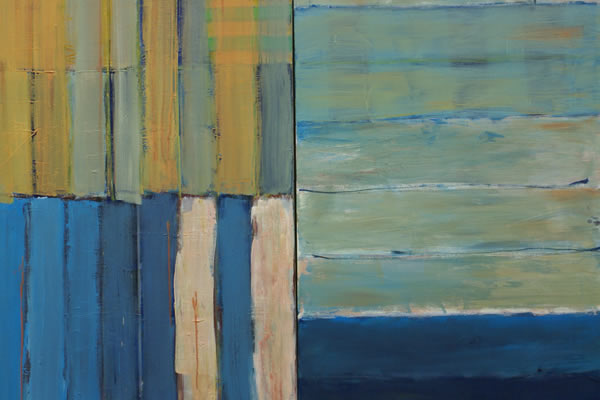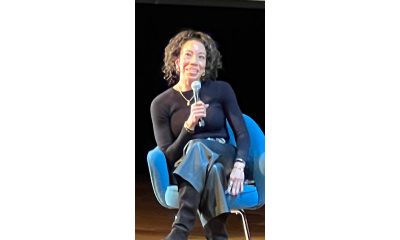Arts & Entertainment
Art of the matter
All the D.C.-regional galleries have bounteous fall exhibits planned


Many galleries have new exhibits opening this fall season including Touchstone Gallery’s ‘Color Grids’ featuring works by Charlie Dale such as ‘Chesapeake Waterman.’ (Photo courtesy Touchstone)
There are a lot of galleries all over the D.C. area and they all have new shows starting this fall season.
The Corcoran Gallery of Art (500 17th St., N.W.) has many events coming up. On Saturday, from 10 a.m. to 5 p.m., performer, choreographer and filmmaker Maida Withers will be giving an interactive performance with improvisation and a temporary installation. On Sep. 27 at 7 p.m. for Cosmo Couture 2012, the gallery will be holding “Fashion, Identity and Interiors: The Cosmo Couture Creative Process.” Tickets to this event are $15 for the public and $12 for members.
The gallery is having the first of what is planned to be an annual community day on Oct. 20 from 10 a.m. to 3 p.m. This event is free and for all ages. There will also be an exhibit entitled “Decades: 100 Years of Style and Fashion” on display on Oct. 25 at 7 p.m.
For more information on Corcoran and its upcoming events and exhibits, visit corcoran.org.
The Smithsonian’s Freer|Sackler Gallery (105 Independence Ave., S.W.) has a variety of exhibits coming up this season.
On Sep. 28, the gallery will be hosting “Asia After Dark: Asian Soundscape with DJ Spooky” at 7 p.m. The event will feature music set against Asian silent films. Attendees will be able to make their own eco-friendly drum and learn how to play rhythms from Asia. Tickets are $25 in advance,$30 at the door and $15 for Silk Road Society members.
“Nomads and Networks: The Art and Culture of Ancient Kazakhstan” featuring gold objects and gilded horns will be on display through Nov. 12.
“Road of Arabia: Archaeology and History of the Kingdom of Saudi Arabia” opens Nov. 17. It will feature recently discovered archaeological material never seen in the U.S. including alabaster bowls, glassware, earrings and more. The exhibit will be on display through Feb. 24.
The Peacock Room will be on display, restored for the first time to its appearance in 1908. The room will be open through spring.
For more information, visit asia.si.edu.
Touchstone Gallery’s (901 New York Ave., N.W.) exhibits “Color Grids,” featuring paintings by Charlie Dale and “Seen/Unseen” featuring works by Rosemary Luckett, have already opened, but there will be an event on Sep. 20 from 6 to 8:30 p.m.
They gallery also has a few exhibits opening in October including a members show, Photoweek show and exhibits featuring work by Ai-Wen Wu Krats, Rhona Schonwald and Michael Lant. In November, a show featuring works by Gale Wallar opens.
For more information on Touchstone and the upcoming shows, visit touchstonegallery.com.
The Virginia Museum of Fine Arts (200 North Blvd.) has multiple exhibits this season.
“Gesture: Judith Godwin and Abstract Expressionism” features 25 paintings by Godwin exploring a critical period in the artist’s development, will run through Jan. 27. “Fine Arts and Flowers” will feature work from more than 75 garden clubs through Virginia interpreting masterworks in VMFA’s collection with floral arrangements and will run through Oct. 28.
“Photography and Abstraction in the 1950s and ‘60s” will open Nov. 17 featuring work by photographers such as Aaron Siskind, Harry Callahan, Minor White and Gita Lenz. The exhibit will be on display through July.
For more information, visit vmfa.museum/exhibitions.
Artisphere (1101 Wilson Blvd., Arlington) is celebrating its second anniversary weekend in October with several exhibits. Opening Oct. 4 is “Craig Colorusso: Sun Boxes” at Freedom Park and Waterview Plaza at Le Meridien Hotel. “Forro in the Dark and Alma Tropicalia,” a party featuring Brazilian music and more is Oct. 6 at 8 p.m. in the Ballroom. Tickets are $20. On Oct. 7, there will be a free family day open house from 1 to 4 p.m.
Artisphere will also be holding Yarn Bomb meet-ups and stitch sessions on Wednesdays from 6 to 9 p.m. starting Oct. 17.
There are a few exhibits currently on view that will run throughout the fall including “Beyond the Parking Lot: The Change and Re-Assesment of Our Modern Landscape” will run through Nov. 4 and was inspired by the Joni Mitchell song “Big Yellow Taxi” and features contemporary landscapes by artists who are observing these changes, exposing the use of the environment in compromising ways and instigates the discussion of “where do we go from here?”
For more information, visit artisphere.com.
Torpedo Factory (105 North Union St.) is having a free event during the Alexandria King Street Art Festival. The sixth annual Art Activated will give festival attendees not only a place to cool down, but also several hands-on activities. Visitors can do screen-printing, bubble gum art, create their own button and more. There will also be a Q-Art Code Scavenger Hunt with a chance to win a $150 gift certificate to the Torpedo Factory.
For more information, visit torpedofactory.org/artactivated.
Other galleries that always have interesting exhibits and are worth checking out include Aaron Gallery at 2101 L Street NW (aarongallerydc.com), The Art League in Alexandria at 105 North Union Street (theartleague.org), Hillwood Estate, Museum and Gardens at 4155 Linnean Ave., N.W. (hillwoodmuseum.org), the Fridge D.C. at 516 8th Street, S.E. (thefridgedc.com) the Kreeger Museum at 2401 Foxhall Road, N.W. (kreegermuseum.org), the National Gallery of Art at 4th and Constitution Ave., N.W. (nga.gov) and the brand new Northern Virginia Art Center at 2120-A Crystal Plaza Arcade in Arlington (novaartcenter.org).
Out & About
Plan your wedding the LGBTQ way
Washington D.C. LGBTQ+ Wedding Expo scheduled for Sunday

Rainbow Wedding Network will host “Washington D.C. LGBTQ+ Wedding Expo” on Sunday, March 1 at 12:30 p.m.
Guests can meet and mingle with a curated selection of LGBTQ-welcoming wedding professionals from across the region, each ready to help bring your vision to life, and spend a beautiful afternoon exploring everything they need to create a celebration that reflects them.
There will be a relaxed, self-guided look at the Watergate’s spaces and amenities, savor signature cocktails and delicious tasting samples, and connect with other couples who are on the same journey.
Visit Eventbrite to reserve a spot.

Friday, February 27
Center Aging Monthly Luncheon With Yoga and Drag Bingo will be at 12 p.m. at the DC Center for the LGBT Community. Email Mac at [email protected] if you require ASL interpreter assistance, have any dietary restrictions, or questions about this event.
Go Gay DC will host “LGBTQ+ Community Happy Hour Meetup” at 7 p.m. at Freddie’s Beach Bar and Restaurant. This is a chance to relax, make new friends, and enjoy happy hour specials at this classic retro venue. Attendance is free and more details are available on Eventbrite.
Trans Discussion Group will be at 7 p.m. on Zoom. This group is intended to provide an emotionally and physically safe space for trans people and those who may be questioning their gender identity/expression to join together in community and learn from one another. For more details, email [email protected].
Saturday, February 28
Go Gay DC will host “LGBTQ+ Community Brunch” at 11 a.m. at Freddie’s Beach Bar & Restaurant. This fun weekly event brings the DMV area LGBTQ+ community, including allies, together for delicious food and conversation. Attendance is free and more details are available on Eventbrite.
The DC Center for the LGBT Community will host “Sunday Supper on Saturday” at 2 p.m. It’s more than just an event; it’s an opportunity to step away from the busyness of life and invest in something meaningful, and enjoy delicious food, genuine laughter, and conversations that spark connection and inspiration. For more details, visit the Center’s website.
Black Lesbian Support Group will be at 1 p.m. on Zoom. This is a peer-led support group devoted to the joys and challenges of being a Black lesbian. You do not need to be a member of the Beta Kappa Chapter or the Beta Phi Omega Sorority in order to join, but they do ask that you either identify as a lesbian or are questioning that aspect of your identity.Send an email to [email protected] to receive the zoom link.
Sunday, March 1
LGBTQ+ Community Coffee and Conversation will be at 12 p.m. at As You Are. This event is for people looking to make more friends and meaningful connections in the LGBTQ community. Attendance is free and more details are available on Eventbrite.
Monday, March 2
“Center Aging: Monday Coffee Klatch” will be at 10 a.m. on Zoom. This is a social hour for older LGBTQ+ adults. Guests are encouraged to bring a beverage of choice. For more information, contact Adam ([email protected]).
Tuesday, March 3
Universal Pride Meeting will be at 7 p.m. on Zoom. This group seeks to support, educate, empower, and create change for people with disabilities. For more details, email [email protected].
Wednesday, March 4
Job Club will be at 6 p.m. on Zoom upon request. This is a weekly job support program to help job entrants and seekers, including the long-term unemployed, improve self-confidence, motivation, resilience and productivity for effective job searches and networking — allowing participants to move away from being merely “applicants” toward being “candidates.” For more information, email [email protected] or visit www.thedccenter.org/careers.
Center Aging Women’s Social and Discussion Group will be at 6 p.m. on Zoom. This group is a place where older LGBTQ+ women can meet and socialize with one another. There will be discussion, activities, and a chance for guests to share what they want future events to include. For more information, email [email protected].
Thursday, March 5
The DC Center’s Fresh Produce Program will be held all day at the DC Center for the LGBT Community. People will be informed on Wednesday at 5 p.m. if they are picked to receive a produce box. No proof of residency or income is required. For more information, email [email protected] or call 202-682-2245.
Virtual Yoga Class will be at 7 p.m. on Zoom. This free weekly class is a combination of yoga, breathwork and meditation that allows LGBTQ+ community members to continue their healing journey with somatic and mindfulness practices. For more details, visit the DC Center’s website.
a&e features
Transmission DC breathes new life into a storied sound space
A fresh home for boundary-pushing culture on H Street

Late last year, phoenix-style, a fresh home for boundary-pushing culture arose on the H Street corridor. Transmission DC – a queer, trans, and POC-owned, operated, and centered community-focused venue – powered on in the former home to the Rock & Roll Hotel (famously, not a hotel, but very much rock & roll). Transmission (1353 H St., N.E.) arrives secure in its mandate – or even birthright – to provide a place to celebrate creativity and music through a lens of inclusivity and respect.
Transmission’s team brings experience, but also representation. Owners/partners Kabir Khanna (who is also programming director), Katii B, Ellie McDyre, and Kelli Kerrigan together previously managed 618 productions, a venue in Chinatown, crafting “some of D.C.’s freakiest parties, raves, and mosh pits” they note.
They packed up operations last fall to a space curated specifically for D.C.’s underground music and culture scene, building their efforts in Chinatown to bring in more fans in queer and POC circles.
Transmission, Khanna points out, is built on DIY values. In the music scene, DIY means that promoters and organizers – often disconnected from the mainstream and part of marginalized communities – build shows and programs collaboratively, but independently from institutions, supporting each other as smaller, independent venues close. Here, Transmission aims to ensure that those putting together these underground inclusive shows have a more permanent and stable home, can have access to resources, and can provide more sustainable income to artists. “We’re trying to get more people to support and enjoy the music, and also give artists and organizers within the DIY community more structure and a larger cut,” says Khanna.
Khanna also notes that Transmission operates “under the principles of safety, inclusivity, and respect.” McDyre added that even at venues that claim inclusivity, that statement might not take place in practice. We’re “not just pitting up a rainbow flag,” says McDyre, but as some of the owners are trans and POC, audiences can see themselves reflected at the top.
Much like the DIY nature of the music community, the Transmission owners brought a DIY ethos to turning around their space.
In March 2020 – the height of COVID lockdowns – Rock & Roll Hotel suddenly shuttered, though not due to the pandemic; instead, the venue claimed that decreasing sales and increasing competition led to the closure. For 14 years, it was the central spot for cheap beer and lesser-known and celebrated acts. The space stood vacant for more than five years, until Transmission turned the power back on.
“When we got into the space, it was effectively abandoned for years,” says Khanna. “There was a ton of mold, and paint primer covering all surfaces. It was nearly falling apart.” Khanna noted that many music venues like this one, regardless of how well it was maintained, “get the shit kicked out of it,” given the nature of shows. The team called in mold removal contractors, ripped up most of the floorboards, and started fresh.
Transmission’s first floor is styled as a stripped-down black box: the better to take in the music. “It’s minimal on purpose to act as a canvas for set design and music,” without a specific aesthetic, says Khanna. Moving upstairs, the second floor has been opened up, removing some walls, and now has a larger dance area than the first floor. Beyond the first two performance levels, and a holdover from Rock & Roll Hotel, is the rooftop. Though without a stage, the rooftop space is filled with murals splashed across the walls, with a full bar. Transmission’s current capacity is 496, but the team is looking to grow that number. Transmission will also leverage the full kitchen that Rock & Roll Hotel operated, bringing in Third Hand Kitchen to offer a variety of food, including vegan and vegetarian options.
Khanna pointed out an upcoming show reflective of Transmission’s inclusive ethos: Black Techo Matters on Feb. 27. The event is set to be “a dynamic, collaborative night of underground electronic music celebrating Black History Month.” Khanna says that techno came from Black music origins, and this event will celebrate this genesis with a host of artists, including DJ Stingray 313, Carlos Souffront, and Femanyst.




















